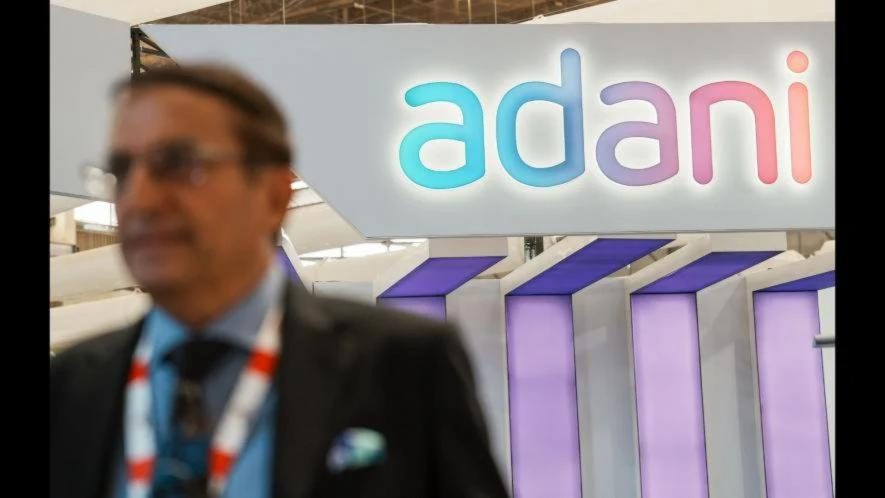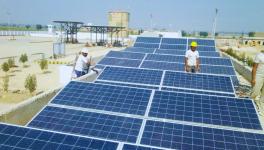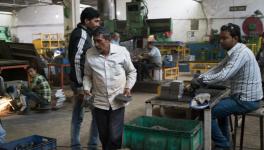Civil Society Groups Urge SBI-led Consortium not to Invest in Adani Plant

File Image
More than 100 groups and individuals have urged the State Bank of India-led consortium not to invest in Adani's coal-to-PVC project in Mundra, Gujarat. They have released a statement claiming that the investment would be detrimental to the environment, society, and climate.
Expressing concern over allegations of financial malpractices involving the Adani Group and investigations being conducted by the Supreme Court-appointed panel and SEBI, the letter the SBI-led consortium to prioritise sustainable finance and development goals, as well as international energy and climate commitments. Public concerns should always be addressed before making any risky investment decisions, the statement noted.
As per news reports last week, a State Bank of India-led consortium of banks plans to invest Rs 34,000 crore in "the first phase of the Adani Enterprises led Coal to Poly Vinyl Chloride (PVC) project in Mundra, Gujarat." The construction of the plant was suspended following Hindenburg Research's investigation into the Adani group.
"At a time when Adani Enterprises is overleveraged and is under an ongoing investigation, the reported attempt by public sector banks to raise Rs 14,500 crore and the remainder by private banks, is a severe undermining of public trust in custodians of public money."
Read the full statement here:
Don't Invest Public Money in high-risk Adani Coal to PVC Plant
Date: July 31, 2023
We, the undersigned, express our deep concern on reports in the news media which state that a State Bank of India (SBI) led consortium is planning to invest Rs 34,000 crore in the first phase of Adani Enterprises led Coal to Poly Vinyl Chloride (PVC) project in Mundra, Gujarat. We urge the SBI-led consortium to refrain from investing public money entrusted to them in the Adani Group, which has been under investigation by a Supreme Court-appointed panel and by the Securities and Exchange Board of India (SEBI) for alleged financial malpractices. In addition, big-ticket investments in environmentally harmful projects go against the bank's own commitments to sustainable finance and Sustainable Development Goals and India's International energy and climate commitments.
The proposed 2 million ton per annum coal to PVC plant, being constructed by Adani subsidiary Mundra Petrochem Ltd., bore the direct brunt of Hindenburg Research's investigation alleging massive fraud by the conglomerate. The Company reportedly was forced to suspend construction of the plant in the wake of the allegations as Adani Group experienced massive losses in the market value of its shares and bonds. At a time when Adani Enterprises is overleveraged and is under an ongoing investigation, the reported attempt by public sector banks to raise Rs 14,500 crore and the remainder by private banks, is a severe undermining of public trust in custodians of public money.
According to an assessment carried out last year by CreditSights, a credit assessment unit of the Fitch Group points to the Group's high indebtedness, over-leveraged operations and debt-driven expansion into highly capital-intensive projects in a wide range of new sectors. According to this report, "excessive debt and over-leveraging by the group could have a cascading negative effect on the credit quality of the bond issuing entities within the group and heightens contagion risk in case any entity falls into distress."
Another report on the extent of over-leveraging of Adani Group's activities appeared in the press in 2019. The report highlighted the complex web of subsidiaries set up by the Group to carry on its operations in diverse sectors and pointed to excessive debt dependence and leverage among the Group's subsidiaries. The banks led by SBI need to immediately clarify their stand on the reports in order to restore the faith of crores of depositors and shareholders.
It is important to note that coal-based projects became the principal line item in India's terrifying bad loans problem, contributing to more than Rs 1.74 lakh crores in NPAs. This Coal to PVC project has the potential to join the long list.
In addition to financial risks, this project also carries high climate risks. In June 2023, Mundra found itself in the path of a category 3 cyclone Biparjoy. Scientists have predicted that cyclones in the region could get more frequent and severe. Nagarjuna refinery in Tamilnadu was similarly impacted by cyclone Thane in 2011, and the company had to eventually file for bankruptcy, causing a loss of thousands of crores to their lenders.
In addition, what is worrying is the fact that coal to PVC is an attempt to rehabilitate coal through the backdoor. At a time when India is geared to phase down coal and is about to put an end to coal-fired power plants to mitigate the climate crisis and achieve 'net zero' by 2070, building a coal-based plant for PVC manufacturing goes directly against the country's climate commitments.
The coal-based manufacturing of PVC is highly environmentally damaging, emitting three times more greenhouse gases than conventional plastic production, exacerbating both the plastic waste and climate crisis. The coal to PVC plant in question, with numerous flue gas and process vent stacks, releases harmful particulate matter leading to various health problems, including respiratory issues and heart diseases. Vinyl chloride monomer from which PVC is made is listed as an International Agency for Research on Cancer (IARC) Group 1 carcinogen. Exposure to vinyl chloride causes liver cancer, eye, lung, and throat irritation, respiratory problems, adverse effects on newborns, and heart diseases. Additionally, toxic sulphur dioxide emissions pose severe risks to the respiratory system, contributing to acid rain and harming vegetation. Furthermore, the release of nitrogen oxides worsens greenhouse gas formation and generates hazardous gases, posing a significant threat to the climate, people, their livelihoods, and the environment in the Mundra region, all while the world is moving away from coal and fossil fuels.
The proposed plant plans to utilise 31 lakh tonnes of imported coal annually, adding a toxic pollutant burden to an already heavily polluted area near the Adani Port and Special Economic Zone in Mundra. This adds to the environmental concerns and challenges faced by the community in a region which already has several polluting and toxic industries.
The proposed investment thus shatters public faith and poses immense environmental, social and climate dangers. Adani Group's unsustainably high indebtedness, overleveraged operations, poor interest cover and continuous investment into commercially un-viable coal projects pose a serious threat to the stability of the financial system, the health of the banking system and indeed our economy. The bank's management should immediately put the public's doubts at rest and not go ahead with this high-risk investment.
Get the latest reports & analysis with people's perspective on Protests, movements & deep analytical videos, discussions of the current affairs in your Telegram app. Subscribe to NewsClick's Telegram channel & get Real-Time updates on stories, as they get published on our website.
























